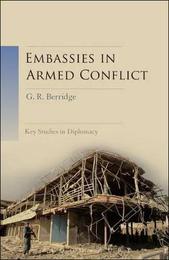
|
Embassies in Armed Conflict
Paperback / softback
Main Details
| Title |
Embassies in Armed Conflict
|
| Authors and Contributors |
By (author) Professor G. R. Berridge
|
| Series | Key Studies in Diplomacy |
|---|
| Physical Properties |
| Format:Paperback / softback | | Pages:192 | | Dimensions(mm): Height 216,Width 138 |
|
| ISBN/Barcode |
9781441180070
|
| Classifications | Dewey:327.2 |
|---|
| Audience | | Professional & Vocational | |
|---|
|
Publishing Details |
| Publisher |
Continuum Publishing Corporation
|
| Imprint |
Continuum Publishing Corporation
|
| Publication Date |
2 February 2012 |
| Publication Country |
United States
|
Description
This is an examination of how embassies work and cope during wartime, with a focus on the experiences of the British, American, and Indian embassies. During wartime, embassies assume different roles and face various situations. An embassy might represent a belligerent state while being situated in an enemy, an allied, or a neutral state. Conversely, it might represent a neutral state, while having to function in a belligerent state. How does an embassy's situation affect its priorities? How does it affect its staff and mission? The work and risks they face may vary greatly, but embassies play a key role in war, a time when they are required to give higher priority to military and political intelligence while facing daily risks of attacks and managing media and high-ranking visitors. "Embassies in Armed Conflict" examines these issues and the problems wartime embassies encounter by looking primarily at the experiences of American, British, and Indian embassies. Written by a leading expert, the book aims to both examine the role of wartime embassies and to provide guidance for those who serve - or wish to serve - in the Foreign Service. The volumes in the series are relatively short handbooks aimed at beginning practitioners and advanced university students. The volumes highlight the ways foreign policy is implemented through the apparatus of diplomacy, the diplomatic system, and diplomats and will discuss: specific aspects of diplomacy, such as the concept of diplomatic relations, the consequences of cutting off diplomatic relations, diplomatic immunity, etc., and key diplomatic activities and events, such as an international crisis, or a summit meeting. Such books will focus on the conduct of diplomacy rather than its politics. The focus will be on the contemporary practice of diplomacy, not on foreign policy or the theoretical direction of diplomacy.
Author Biography
G. R. Berridge is Emeritus Professor of International Politics at the University of Leicester, UK, and a Senior Fellow of DiploFoundation. He was for many years general editor of the Palgrave Macmillan Studies in Diplomacy series, and Associate Editor for twentieth century diplomatists of the Oxford Dictionary of National Biography. He has written numerous books on diplomacy, including a best-selling textbook, Diplomacy: Theory and Practice (4th ed; 2010) and the Dictionary of Diplomacy (2004).
Reviews"The study of the resident embassy is a key component of diplomatic studies degrees and an expanding area of interest among scholars -- largely because the Embassy itself remains an essential institution of international communication. In this, his latest book, the leading scholar of diplomacy G.R. Berridge explores a little-studied aspect of the subject, the performance of embassies in times of war. Clearly structured, lucid in style and with a host of historical examples, the book will be read with interest by students, academics and practitioners alike." -- John W. Young, Professor of International History, University of Nottingham, UK and author of Twentieth Century Diplomacy. [I]t is difficult to identify another scholar with Berridge's depth and breadth of insight into this material. The volume is not a text book, but the author writes with a clarity and wit that will make the material accessible to students of diplomacy as well as offering significant pause for thought to more seasoned scholars.This is an excellent book that will be of use to a wide range of scholars of international diplomacy. The depth of its erudition and the range of its scope will appeal not only to scholars of diplomatic theory but to diplomatic practitioners anxious to know the heritage of their profession. Its brevity - the book is a mere 177 pages - will also appeal to students keen to get to the heart of cutting-edge thinking on diplomacy quickly. While the book's excellent bibliography offers not only opportunities for further research but helps place Berridge's oeuvre within its wider historiographical context. I highly recommend this book. -- Gaynor Johnson * LSE Review of Books * The book will be extremely useful to practitioners and to students of diplomacy, and the history of diplomacy, alike ... It is well written and demonstrates a mastery of the subject. -- John Fisher, University of West England Bristol * Diplomacy & Statecraft *
|